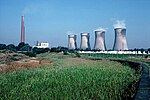Salford City Football Club is a professional football club in Salford, Greater Manchester, England. The club competes in League Two, the fourth tier of the English football league system.
The club was founded as Salford Central in 1940, and played minor local league football until winning a place in the Manchester League in 1963. Salford were winners of the Lancashire Amateur Cup in 1971, 1973, and 1975 and the Manchester Premier Cup in 1978 and 1979. The club joined the Cheshire County League in 1980, which amalgamated into the North West Counties Football League (NWCFL) two years later. They changed their name again in 1989, to Salford City, and secured promotion into the Northern Premier League (NPL) in 2008. The club survived in the league on the final day of the following season, an achievement known in club folklore as The Great Escape.
In 2014, Salford were taken over by former Manchester United players Nicky Butt, Ryan Giggs, Gary Neville, Phil Neville, and Paul Scholes, who each own 10% of the club, with Singaporean businessman Peter Lim owning the rest; David Beckham purchased a 10% share from Lim in 2019. Under the management duo of Anthony Johnson and Bernard Morley, they were crowned NPL Division One North champions in 2015, won the NPL Premier Division play-offs in 2016, and the National League North title in 2018. This success was followed in 2019 with promotion to the English Football League (EFL) after winning the 2019 National League play-off final, under the stewardship of Graham Alexander. Salford won the EFL Trophy in their début campaign.
Salford play their home games at Moor Lane, which underwent a major transformation between 2016 and 2017, and is currently known as the "Peninsula Stadium" for sponsorship purposes. The club have primarily worn tangerine shirts and black shorts throughout their recorded history, before switching to red shirts and white shorts following the takeover. The club's nickname, The Ammies, stems from their name from the early 1960s to the early 1970s, Salford Amateurs. The club's anthem is The Pogues cover of "Dirty Old Town", a song written by Salford local Ewan MacColl.







